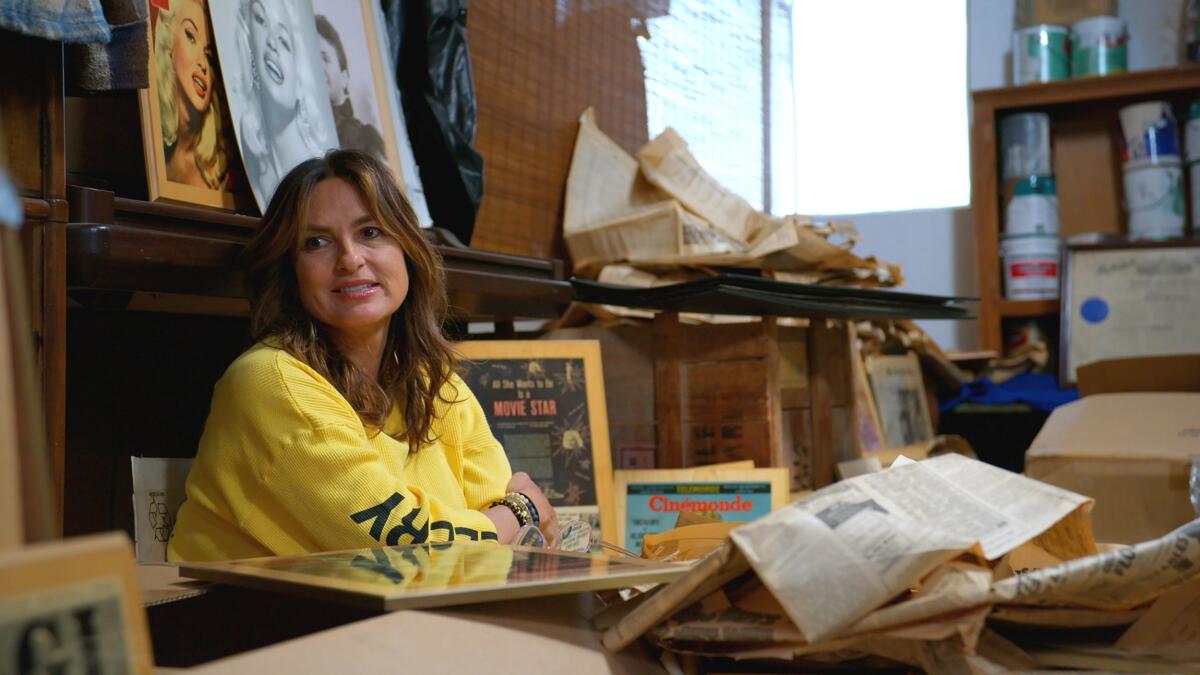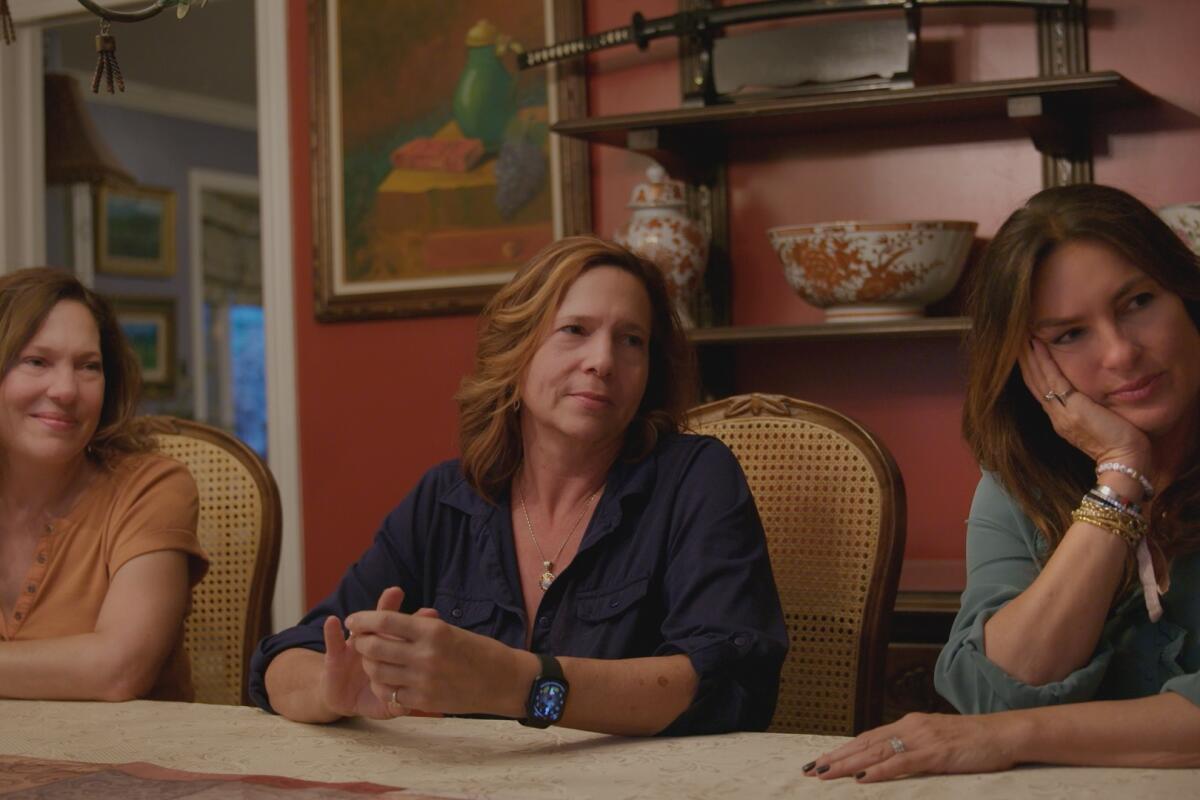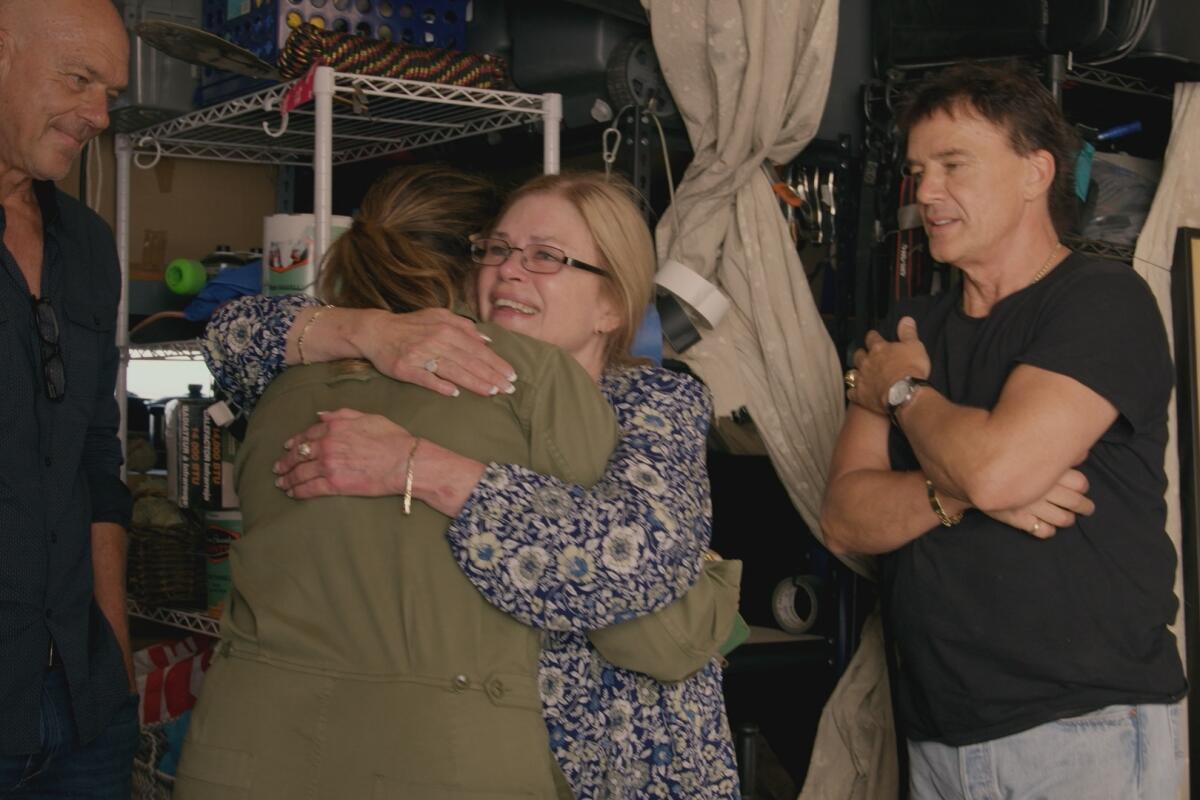In ‘My Mom Jayne,’ Mariska Hargitay grapples with a secret and her mother’s choices

- Share via
That Mariska Hargitay is the daughter of Jayne Mansfield is one of those things everyone who knows anything about either of them seems to know — in some cases maybe the only thing. Even Hargitay — who was only 3 years old when, in 1967, her mother died in a road accident, which she and two brothers survived — had much to learn about her, and she spent most of her life not learning it. Now, in her inquisitive 60s, she has put that belated search “to know her not as the sex symbol Jayne Mansfield but just as Jayne, my mom, Jayne” into a sad, sweet, generous documentary film, appropriately titled “My Mom Jayne,” which comes to HBO Friday.
Other than a few photos and contextless clips, Hargitay does not turn a spotlight on her own career, perhaps assuming that 26 seasons of “Law & Order: Special Victims Unit” speak for themselves. (In 2024, she was the highest-paid actress in television.) A quarter of the way through the 21st century, Mansfield will be mostly known to connoisseurs of mid-century tabloid culture and fans of Frank Tashlin, who directed her in the relatively big-budget films “Will Success Spoil Rock Hunter?,” in which she had appeared on Broadway, and “The Girl Can’t Help It,” from which Paul McCartney learned Eddie Cochran’s “Twenty Flight Rock,” impressing John Lennon enough to let him into his group. Many will have seen a much-reproduced photograph of Sophia Loren giving side-eye to Mansfield pouring out of a dress at a Hollywood function without being able to identify either of them. Such are the sorrows of passing time.
Documentaries in which the director uses film as a way to approach some unknown aspect of family history are not uncommon. There are, for example, Sarah Polley’s “Stories We Tell,” which, like “My Mom Jayne” deals with late-discovered questions of parentage; Carl Colby’s “The Man Nobody Knew: In Search of My Father, CIA Spymaster William Colby”; “Bright Leaves,” Ross McElwee’s film about his family’s involvement in the tobacco business; and “2 or 3 Things I Know About Him,” in which German director Malte Ludin unpacks the story of a high-ranking Nazi father. There’s nothing that dark in Hargitay’s family history, but there is trauma and tragedy: for the actor, who wanted to be taken seriously, and did try, finally, to course-correct her image; for the person, who suffered from what was probably depression, turned to alcohol and pills, made some bad choices in men and died young, at 34; and for the children she left behind, trying to make real a person they barely knew, or don’t remember at all — to fill “this little hole in my heart,” says Hargitay.

Mansfield, who moved from Texas to Hollywood in hopes of becoming a dramatic actor was instead remade in the image of Marilyn Monroe, the age’s signature big-breasted blond bombshell. Auditioning for Paramount casting head Milton Lewis, she said, “He just seemed to think that I was wasting, as he said, my obvious talents. And he lightened my hair and tightened my dresses, and this is the result.” A willingness to pose for cheesecake pictures, at a time when movie magazines proliferated and men’s magazines were coming on, sealed that deal: “I used my pinup-type publicity to get my foot in the door. … I use it as a means to an end.”
That she was more than a pinup was not even then a secret — a Life magazine cover story at the time of “Rock Hunter” called her “Broadway’s smartest dumb blonde.” Appearing on Groucho Marx’s TV show “Tell It to Groucho,” the host — who had appeared in the film of “Rock Hunter,” says, “You’re not the dumb blond that you pretend to be. I think that people ought to know that you’re really a bright, sentimental and understanding person. This is a whole facade of yours that isn’t based on what you actually are. This is a kind of act that you do, isn’t it?” And yet it didn’t matter whether she was smarter than the characters she played, or the character she played in public, or that she spoke multiple languages and could play the piano and the violin. (“Who cares? Kiss me!” said Jack Paar, interrupting her as she played the latter.) It made her seem like a contradiction in terms, a performing seal, rather than a complex human being.
As to her daughter: “At a certain point I began to carry a lot of shame about her image as a sex symbol and all the choices that came with that. So I pushed the idea of my mom further and further away from my life.” She decided that her own career would look very different.
Mariska was born near the end of Mansfield’s marriage to Mickey Hargitay, a Hungarian athlete and adagio dancer, who became Mr. Universe after moving to America; it seems to have been a loving relationship, even after their divorce. But in her 20s, Mariska became aware, independently, that her biological father was an Italian nightclub entertainer named Nelson Sardelli. She was angry, she says, at her dead mother “for leaving me in this mess. And for hurting my father. And for leaving me feeling so alone and untethered.” At the same time, she wondered whether her biological father knew about her, and if he did, “Why didn’t he claim me?” At 30, she went to Atlantic City where he was performing, and said, “I understand you knew my mother.” She told Mickey about the meeting — he was aware of the facts, which he had kept secret — and he was so upset that she never brought it up again. (“Don’t read the books about your mother,” he had told her earlier. They’re “full of lies.”)

Giovanna Sardelli, left, and Pietra Sardelli are Mariska Hargitay’s half-sisters by way of her biological father, Nelson Sardelli. (HBO)

Mariska Hargitay grew up with her siblings Mickey Hargitay Jr., left, Jayne Marie Mansfield and Zoltan Hargitay. (HBO)
Ironically, her mother’s wayward romantic life left Hargitay with a passel of siblings, all of whom are present here, and with whom she seems fairly to very close: older sister Jayne Marie Mansfield, from Mansfield’s first marriage; brothers Zoltan Hargitay and Mickey Hargitay Jr., with whom she grew up; Tony Cimber, Jayne’s son from her brief third marriage, to director Matt Cimber, when the family temporarily became “Italian” and Mariska became Maria; and sisters Giovanna and Pietra Sardelli, from her biological father’s marriage. (“I don’t know how the hell you got me to do this,” says Mickey Jr., sitting for his interview.) Stepmother Ellen Hargitay fills in a lot of holes, without claiming to know everything about everything. (Mickey Hargitay — “my rock” — died in 2006.)
Although the substance of the film is not manufactured, there is art in the presentation. Clips representing Mansfield’s rise to fame are scored darkly, as if to say, this was not the way to go. Because the director is an actor, she knows how to be on camera; her siblings are less … professional, but make strong individual impressions. Hargitay is careful to let everyone have their own say, or keep silent, but these discussions, seemingly had for the first time, are inevitably dramatic and often very moving. There are a few visual effects, to indicate hazy memories, and a through line built around a white piano decorated with cherubim, which ends the film on a happy note.
One of Hargitay’s themes is the toxicity of fame, especially when it’s awarded not for your accomplishments but your attributes. (Edward R. Murrow describes Mansfield as “the most photographed woman in show business,” a superlative she certainly encouraged.) But we get glimpses of a woman who, like her daughter, we’d like to know more of. Jayne Marie remembers accompanying her to visit wounded soldiers at Walter Reed hospital. She’s great in the Tashlin comedies, playing off her public image, but also providing glimpses of the person inside it, while a scene from “The Wayward Bus,” based on a John Steinbeck novel, demonstrates that given the chance, she could handle straight drama.
With better management, or being born into a different time — actors nowadays indulge in cheesecake without being defined by it, as the talk shows and red carpets repeatedly demonstrate — she might have been taken as seriously as she had hoped to be. But that’s a story for a different universe.
More to Read
The complete guide to home viewing
Get Screen Gab for everything about the TV shows and streaming movies everyone’s talking about.
You may occasionally receive promotional content from the Los Angeles Times.







